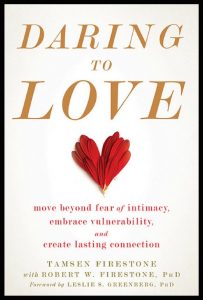Preserving Individuality to Strengthen Your Relationship
 To maintain a successful relationship it is necessary that both people maintain their own individuality and respect the individuality of their partner. Each is concerned with their own and their partner’s continued development as a person. In my book, Daring to Love, I write about achieving this by remaining adult, open, undefended, and honest in your interactions. I also discuss the importance of regarding your partner is a sovereign individual, separate from you and your relationship. A relationship thrives when two strong individuals bring their distinctive and varied qualities to their partnership. The following suggestions are excerpted from Daring to Love.
To maintain a successful relationship it is necessary that both people maintain their own individuality and respect the individuality of their partner. Each is concerned with their own and their partner’s continued development as a person. In my book, Daring to Love, I write about achieving this by remaining adult, open, undefended, and honest in your interactions. I also discuss the importance of regarding your partner is a sovereign individual, separate from you and your relationship. A relationship thrives when two strong individuals bring their distinctive and varied qualities to their partnership. The following suggestions are excerpted from Daring to Love.
Maintaining Your Individuality
To be a better person in your life and a good partner in your relationship, it’s critical that you strive to maintain a strong sense of independence and autonomy and a well-developed point of view. With this ongoing goal, you can continue to cultivate and strengthen your unique traits as well as behavior that reflects your interests and ideals. In your relationship, you need to be careful that you are not looking for someone to complete your incompleteness or to define or affirm you.
Be adult. It’s common for people to complain of their partner being immature and refusing to grow up. Being adult is not just a question of emotionally mature behavior. Being truly adult also involves recognizing your early childhood trauma and losses, taking steps to resolve them, and understanding how they helped shape your current behavior. It means actively identifying and challenging the defenses you formed as a child and correcting the negative attitudes or biases you acquired.
Be open and undefended. Openness involves the ability to be forthright in revealing and expressing your personal feelings, thoughts, dreams, and desires. Being nondefensive and open to feedback is one of the most valuable relationship skills you can develop. Instead of defending yourself from your partner’s criticisms or suggestions, you can look for the kernel of truth in what your partner is saying, because it may offer you an opportunity for personal growth. When you’re concerned in this way with your development as an individual, you can remain open to change in your intimate relationship but also retain your sense of self, your strength, and your individuality.
Being honest is vital to your integrity as an individual, and necessary to the development of trust in your close relationship. It’s best to be honest even when telling the truth is hard. When you are deceptive or directly untruthful with your partner, you betray yourself, and you fracture your partner’s sense of reality. You also damage the trust and closeness between you. Love requires truth because without truth you can’t build and maintain the trust that is essential to an intimate relationship.
Supporting Your Partner’s Individuality
Respect your partner by encouraging your partner’s unique interests and personal goals, independent of your own. Be sensitive to your partner’s wants, desires, and feelings, and place as much value on them as you do on your own. This type of interest in and feeling for your partner is altruistic and goes beyond any selfish or self-serving concerns you may have.
In order to achieve this level of regard, you need to have empathy with and compassion for your partner. This involves using your mind as well as your emotions and intuition to perceive and vicariously experience the nature of your loved one. When you understand your partner in this deeply empathetic manner, you are aware of what you have in common, but you also recognize and value your differences.
It can be helpful to ask yourself the following questions:
- Do I look to my partner to compensate for any of my shortcomings? If so, in what ways?
- Do I use my partner to relieve my insecurities or loneliness?
- Am I an adult in my life and in my relationship? Do I act childish or parental?
- Am I open and nondefensive in my interactions?
- Do I strive to be honest when I communicate?
- Do I have integrity in my life? Do my actions and my words communicate the same message?
- What are some of my partner’s personal interests that are unique to him or her?
- Am I supportive of my partner’s interests? Do I respect them as much as I respect my own?
- Am I threatened by my partner’s separate interests?
- Do I act discouraging or belittling or dismissive of my partner’s separate interests?
- How is my partner different from me? Which differences do I like? Which ones do I dislike?
- Am I successful in empathizing with my partner? Am I able to feel what my partner is experiencing as a person?
- Are there any gender stereotypes that are hurting the respect that my partner and I have for each other in our relationship?
Reprinted with permission: New Harbinger Publications, Inc.
Copyright © 2018 [Tamsen Firestone]
 Daring to Love
Daring to Love
Move Beyond Fear of Intimacy, Embrace Vulnerability, and Create Lasting Connection









If you’re going to maintain your individuality and continue to do the things you did before becoming a partner with someone why be in a relationship at all?
I thought the same Allen but there is a difference between being an individual and acting as if a person is still single.
Being able to work, study, persue goals as an individual is vital to maintain ones identity and sense of self. This is not the same as living a life of a singleton, leading seperate social lives and having holidays alone. Sadly some people want both a partner and compete freedom, but this is not the same as being an individual and maintaining individuality.
A relationship creates a more enriching experience when you have someone to share your not just your common interests with, but friendships, families, new experiences, joy, personal and mutual accomplishments plus as well as grief, pain, sorrow, fears, all your vulnerabilities and so much more! .
It is intended to enrich your life. Being single without a partner to share everything with can be filled with many good things but without any deep intimate connections with another person a human will never truly experience fully what the soul craves more than anything.
It’s imperative to maintain individuality on both sides but also mutually respecting one another’s individuality not expect them to compromise anything they deem extremely important to them. Yet at the same time, if their partner’s choices compromises and prevents their ability to fulfill their own life’s purpose and joy that’s ok but know choosing to end that relationship is actually showing far more love to the other person and yourself than compromising either one of your individual, independent , and equally important lives on this earth.
[…] As Tamsen Firestone wrote in her article: […]
[…] feel love. Studies show that 81% of social media users see relationship posts from others regularly [3]. This exposure makes 23% of partnered adults feel jealous or uncertain about […]